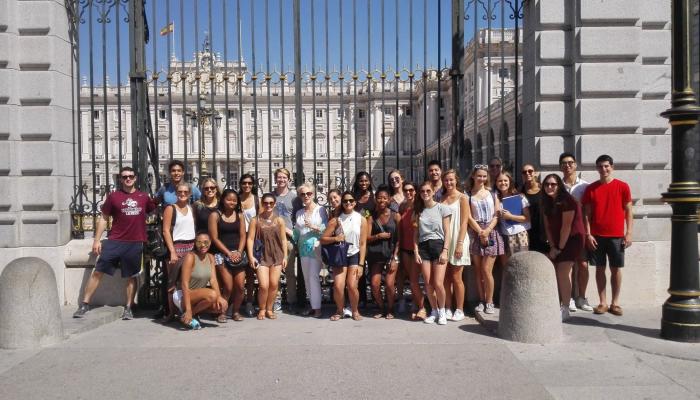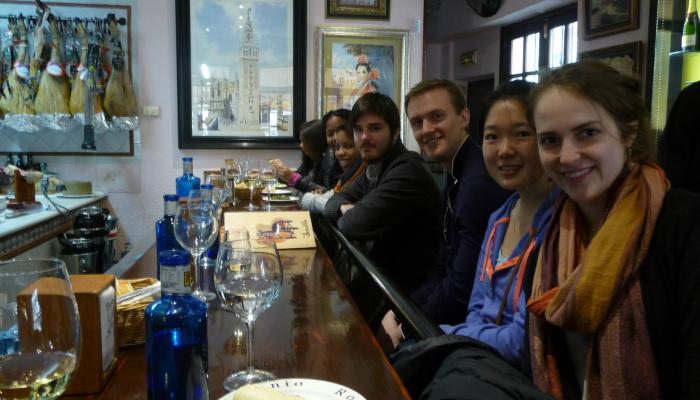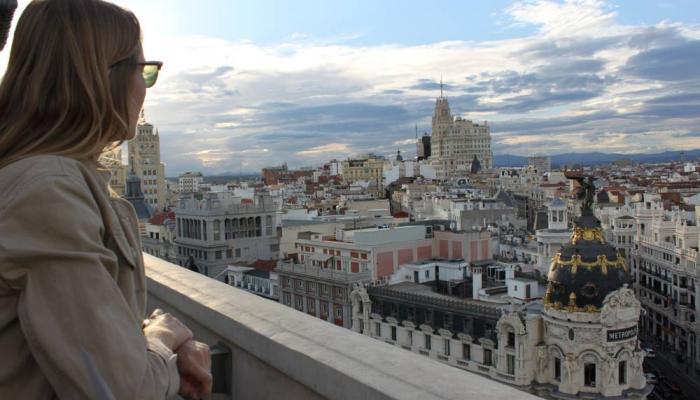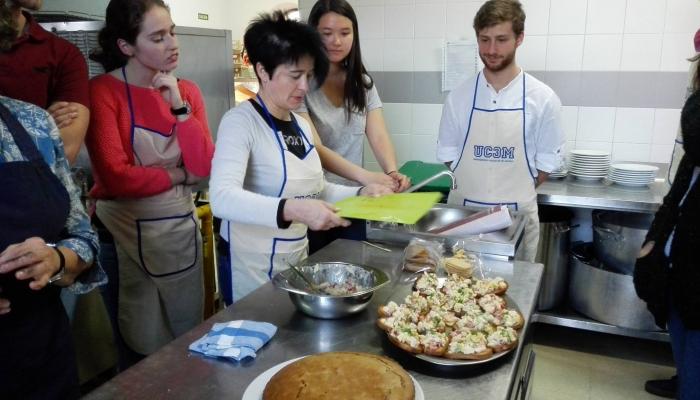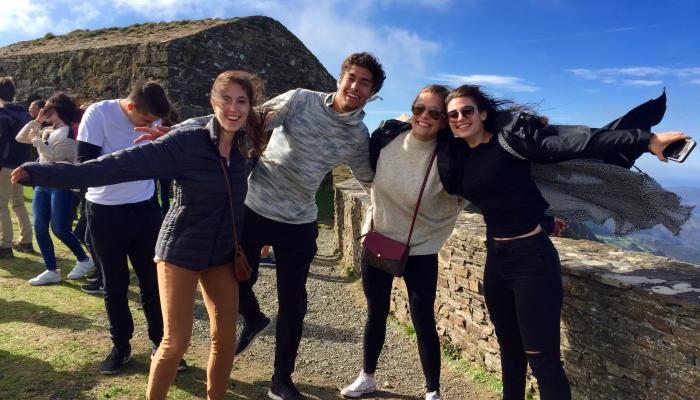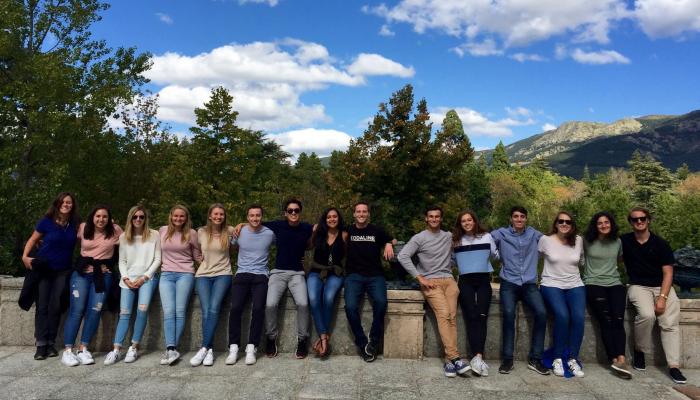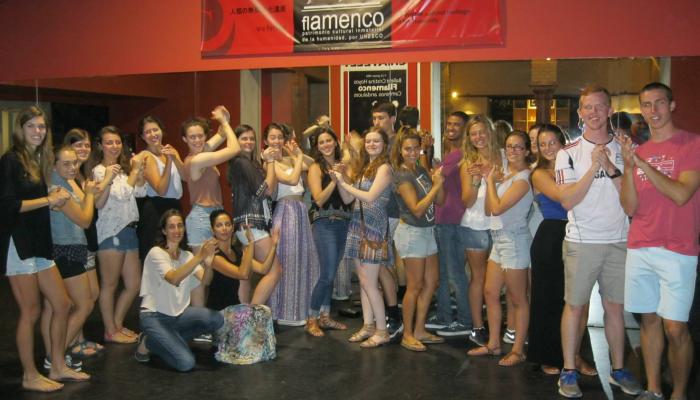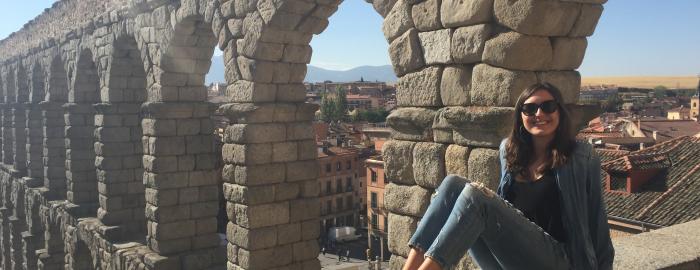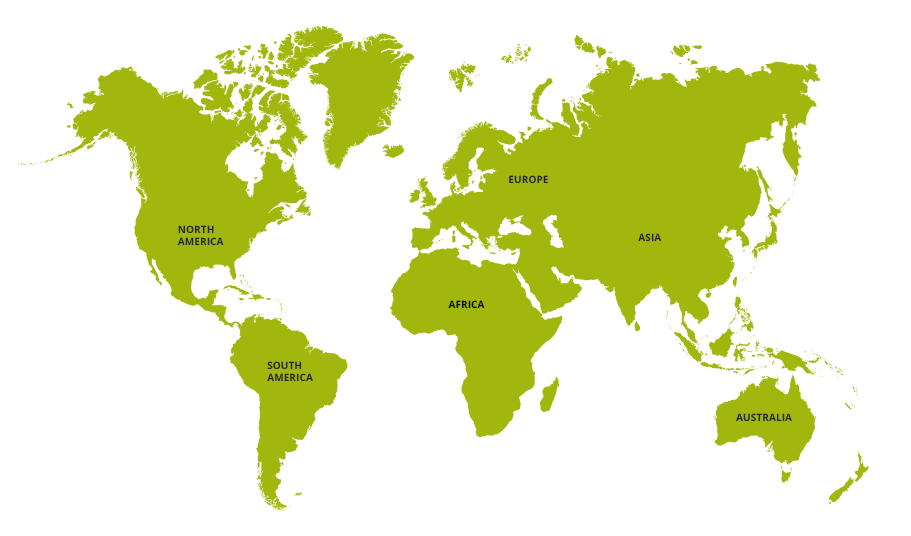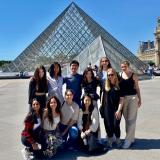Duke in Madrid
Advanced Spanish Language and Culture
Study at Universidad Carlos III
Apply NowThe Duke in Madrid (DIM) program was founded in 1989 and is sponsored by the Department of Romance Studies and the Global Education Office for Undergraduates of Duke University. Committed to a cultural studies perspective, the program aims at improving participants’ Spanish fluency and deepening their understanding of Spain and its many cultures within a global context.
PROGRAM FAST FACTS
Location: Madrid, Spain
Term: Fall, Spring, or Academic Year
Dates: August 27, 2024 - December 21, 2024 (Fall); January 16, 2025 - June 4, 2025 (Spring)
Application Deadlines:
Fall Semester and Academic Year Priority Deadline: December 15
Fall Semester and Academic Year Regular Deadline: March 1
Spring Semester Priority Deadline: August 15
Spring Semester Regular Deadline: October 1 - extended to October 15
Academic Theme(s): Spanish language and culture
Credit Type: Hybrid Credit Structure
Eligibility: Priority will be given to applicants who have completed at least one Spanish course at the advanced level (Duke SPANISH 300 level) or have equivalent proficiency, and have a GPA of 3.0 or above. Non-Duke students are welcome to apply.
Language of Instruction: Spanish, English
Duke Affiliation: Co-sponsored by the Duke Department of Romance Studies
Housing: Residence Hall or Homestay
GEO Advising: Request an appointment
ACADEMICS
Host University
Universidad Carlos III de Madrid (UC3M) is known for its teaching, innovation, and social commitment. In 2009, it was one of five Spanish universities chosen to be a "Campus of International Excellence" by the European Union based on its high quality students, faculty, and staff.
Academic Policies
The Duke in Madrid program is designed with a hybrid credit structure. Students will enroll in two Duke in Madrid Signature Courses and two electives at UC3M. This enrollment configuration is a requirement of the program.
- Duke in Madrid Signature Courses (two courses): Courses will be counted as full Duke credits with Duke numbers, full curricular code eligibility, and final grades that count in the GPA.
- Electives at Host University (two courses): All courses offered by Universidad Carlos III de Madrid (UC3M) will convey to the Duke transcript as transfer credits, provided the U.S. equivalent of a C- or higher is earned in the course. For these courses only, letter grades will not appear on the Duke transcript and will not count in the Duke GPA.
The following policies regarding course load are in effect:
- Students are required to take four full courses (including two signature courses) on this program. No underloads and no overloads are permitted.
- All courses must be taken for graded credit.
- All courses must be taught in Spanish; or students may take up to two engineering or computer science courses taught in English, if desired.
Course Registration
Duke in Madrid Signature Courses – GEO staff will register you for the signature courses you select after your arrival in Madrid. You will not be able to register for Duke in Madrid courses on DukeHub during registration on the Duke campus prior to departure for Spain.
UC3M Transfer Credit Courses – Actual course registration will take place in Madrid at the beginning of the semester. Duke in Madrid staff can help you register for courses and assist you with getting courses approved for transfer credit back to Duke.
Be prepared to be flexible: Please note that Duke University has no control over the course offerings at UC3M in a given semester, so you should not arrive in Madrid absolutely determined to take a specific course. There is no guarantee that a given course will be offered by UC3M or that it will fit into your course schedule.
- DUKE SIGNATURE COURSES
- UC3M COURSES
- SPANISH MAJORS AND MINORS
DUKE SIGNATURE COURSES
Duke in Madrid Signature Courses
Students will select two Duke signature courses from the following options. These courses will be taught at the Duke in Madrid downtown center. Signature courses are for Duke credit with Duke numbers, full curricular code eligibility, and final grades that count in the GPA.
SPANISH 414A / VMS 414A
Ficciones Urbanas e Imaginarios Colectivos: Madrid a través de la Literatura y el Cine
Urban Fiction and Collective Imagination: Madrid Through Literature and Film
(CCI, CZ, FL, ALP), 1.0 credit
(FALL)
This course offers a panoramic look at some of the most important, contemporary artistic and cultural expressions and how they represent Madrid. While looking at historical, social and artistic contexts, we will spend time reflecting and engaging in debates about issues that have been shaping the dynamics of modern cities such as multiculturalism, migration and the role of women. Also, we will look for a way to position Madrid in the face of global questions about Hispanic culture and how it is perceived in other countries.
Instructor: Dr. Patricia Esteban
SPANISH 419A / CINE 419A / VMS 419A
Sacar Los Cuervos, Dar Los Ojos: Spanish Cinema from the Transition to the Present
(ALP, CCI, FL), 1.0 credit
(FALL/SPRING)
This course provides an overview of Spanish cinema, from transition to our present days. Having undergone dramatic transformation in past years, Spanish film offers privileged area to study main features, novelties, contradictions, and tensions. Analyzes two chronological phases: the mid 70s to late 80s, characterized by intense cinematic negotiation with immediate past that unveils cracks and the violence of normalizing erasure proposed from the political institutions; and the 90s until the present, a period marked by Spanish film's entrance in the global market, with its identitarian reassessment and emphasis in new pressing issues such as immigration, memory, and gender violence.
Instructor: Dr. Marcos Canteli
SPANISH 343A / VMS 278A
Decentering Spanish Otherness: Visual Culture and Coloniality in Contemporary Spain
(ALP, CZ, CCI, FL), 1.0 credit
(FALL)
This course proposes the study of visual culture in Spain from the nineteenth century to the present day from decolonial and postcolonial perspectives. It will analyze the history and cultural legacies of Spanish colonialism through photography, film, illustration and art from a transdisciplinary point of view, with special emphasis on cultural studies, visual studies and visual anthropology.
Instructor: Dr. Ines Plasencia
SPANISH 345A / GLHLTH 350A
Movilidad, Salud, y Sistemas Sanitarios
Mobility, Health, and Healthcare Systems
(SS, FL), 1.0 credit
(FALL)
What do we mean when we talk about “access to health?” In this course, this particular question is the focus point of a comparative study of global health in which projects and experiences in Spain (Madrid) will be chosen and studied in light of other European and North American projects and experiences.
We will explore this relation drawing in contemporary situations and in diverse contexts, paying special attention to processes in which diverse mental experiences and human capacities are turned into social inequalities, and what is the role of mental health and disability studies in such injustices. We explore what the social components of health are, and how the axis of inequality (class, race, gender) are affecting the health of individuals and groups of population.
Course taught in Spanish by Professor Fernando Alonso
ENVIRON 144A / SPANISH 344A
La España Ecológica
The Ecological Side of Spain: How Climate, Biology and Territory Define Our Society
(SS, FL), 1.0 credit
(FALL/SPRING)
This course aims to give us a perspective that combines the geography, biology, anthropology, and sociology in a joint vision of Spain as a natural space, and how this configuration is reflected in diverse creative environments: the cinema, literature, photography, or art from both the past and present. Ecology, territory, the rural world, primary economic activity, and nature will guide us in our journey through Spain that, acknowledging its biogeographical and climatic plurality and its decisive character in the landscape and its human uses, will take us from the paleolithic paintings in northwest Cantabria and their intimacy with nature to diverse stops in the Spanish context and the interaction of these stops with the environment and society.
Instructor: Ignacio Fernández Rocafort
SPANISH 420A / LIT 420A
Thinking Language: Poetics from Here and There
(ALP, FL), 1.0 credit
(FALL)
This course provides an overview of current Spanish and Transatlantic poetry, with special attention to poetics (i.e. how poetry thinks the world while it thinks itself). Following critical interventions of authors like Gertrude Stein or Octavio Paz, and poems and reflections of contemporary authors like Antonio Gamoneda, Olvido Garca Valds, or Eduardo Miln, course considers theoretical issues such as subjectivity, poetrys relation to thought, its formal, or the question about reality. Also explores the possibilities of language to serve as a powerful tool of resistance and memory. Students will have the opportunity to meet and converse with some of these poets.
Instructor: Dr. Marcos Canteli
CULANTH 416A / SPANISH 416A
Cultural Lab: Walk, Think, Experiment Now
(ALP, FL), 1.0 credit
(SPRING)
The course parts from the present, from what is happening culture-wise today, to offer the student a wider perspective on cultural systems and creative processes in our recent history. The majority of the class sessions will take place outside of the classroom and will have a participative character. One of the central concepts of this course is transversality, which will allow the student to organize more dynamic and active comprehension networks than what is usually offered by courses in this field of study. Nevertheless, students will always have a base point from which to focus their direction of study related to the modules incorporated into the course: art, literature, architecture, politics, creation, theatre, and technology.
Instructor: Dr. Teresa Soto
SPANISH 390A / RELIGION 390A
Cultures in Contact: Christianity, Judaism and Islam in Medieval Spain and Now
(ALP, FL, CZ, CCI) 1.0 credit
(FALL)
Contact, love, conflict and misunderstanding are familiar identifiers contemporary societies use to label and interrogate interactions. How do we approach each other? How is contact established? What does it mean to be “in contact”? In this course we will explore the idea of contact thought Christianity, Judaism and Islam in their long development in the Iberian Peninsula, from the Medieval Ages until now, paying special attention to the beginning of modernity where the society was undergoing convulsive change, and where their consequences are still relevant today.
Instructor: Teresa Soto
UC3M COURSES
UC3M Courses
All courses offered by the Universidad Carlos III de Madrid (UC3M) will convey to the Duke transcript as transfer credits, provided the U.S. equivalent of a C- or higher is earned in the course. For these courses only, letter grades will not appear on the Duke transcript and will not count in the Duke GPA.
- Cursos de Estudios Hispanicos (CEH): Duke in Madrid students may enroll in only one Cursos de Estudios Hispánicos (CEH) - (Hispanic studies) course at UC3M unless electing to take two Grado courses. The CEH courses include other U.S. and international students and are all taught on the Getafe Campus.
- Grado Courses: All Duke in Madrid students will be required to take at least one, ideally two, Grado courses (regular university courses) at UC3M. Students may take two engineering or computer science courses in English if desired, otherwise all Grado courses must be taken in Spanish.
With the exception of engineering courses, UC3M Grado courses are taught on the Getafe Campus. Engineering courses are taught on the UC3M Leganés Campus, about a 20-minute bus ride from the UC3M Getafe campus. Grado courses include Spanish students.
View Courses
This list of UC3M courses is not meant to be a definitive list of course offerings, but it can give you a good idea of what may be offered, as well as how courses normally count at Duke. Actual course offerings are announced at the beginning of the semester. The list shows the Duke equivalent department(s) and number(s) for each course approved. Curricular codes are also included.
If a course is not listed, it is important that you follow these steps to get courses approved by the Duke departments for transfer credit. This information must be officially recorded by the GEO in the GEO Approved Course Database in order for proper credit to be awarded. Please make sure any course approvals by Duke departments are forwarded to the GEO.
Duke University has no control over the course offerings at the UC3M in a given semester, so students should not arrive in Madrid absolutely determined to take a specific course mentioned on the approved list. Availability of the course is subject to UC3M's final course offerings for the semester.
THERE IS NO GUARANTEE THAT A GIVEN COURSE WILL BE OFFERED BY UC3M OR THAT IT WILL FIT INTO YOUR COURSE SCHEDULE.
The list of approved UC3M courses for transfer credit can also be found in the GEO Approved Course Database. If a course cannot be approved at Duke in a certain department, you will find that information in the database as well.
SPANISH MAJORS AND MINORS
Spanish Majors and Minors
Duke Spanish majors: All courses may be counted toward the major, provided they meet departmental criteria for the major. Credit distribution may vary according to students' needs, with a maximum of three courses counting toward the core course requirement (must have designated Spanish number) and remaining course(s) counting as related courses. Courses must be eligible for Spanish/related credit in order to count toward the major. For students remaining a second semester, two additional courses may be counted as core courses; the rest may be counted as related courses.
Duke Spanish minors: A maximum of two courses with designated Spanish numbers may be counted, provided they meet departmental criteria for the Spanish minor.
Please see the Duke University Undergraduate Bulletin for details on the Spanish major and minor or talk to the Director of Undergraduate Studies of the Department of Romance Studies to clarify if courses will count towards the major or minor.
Non-Duke Student Transcripts
Please note that transcripts will not be sent automatically by any of the Duke-In programs. It is your responsibility to request transcripts from the Duke University Registrar.
The Duke transcript will list all Duke and transfer credits. Upon request, GEO can provide a transcript from UC3M with Spanish grades listed along with a Duke conversion of the Spanish grades. Please email the Duke program manager to request the UC3M transcript.
For more information for Non-Duke students participating on Duke In programs, please review the Guide for Non-Duke Students.
EXCURSIONS
Program participants will experience trips to various locales in Spain, all included in the cost of the program. Excursions include transportation, lodging, guided tours, and some meals. Below are some possible group excursions with Duke in Madrid. Excursion destinations are subject to change each semester.
- Fall Semester
- Spring Semester
- Both Semesters
Fall Semester
Galicia
Our Galicia trip will broaden our cultural and linguistic knowledge, offering an Atlantic perspective of deep singularities and global connections. The group will tour the city of Santiago de Compostela, end of the “Camino De Santiago”, as a historical and cultural nodal point, but we will also explore Galicia’s rural settings or the dramatic cliffs of San Andrés de Teixido, allowing ourselves to immerse in the vast folklore and long prevailing traditions of the region. The group will stay at Casa Alvarella, an ecologically-designed rural guest house located in Las Fragas do Eume Natural Park.
Andalucia: Sevilla and Cádiz
There are no doubts that Andalucía is one of Spain’s most iconic, magical destinations. This semester, DIM will visit two cities, Sevilla and Cádiz. Seville, or Sevilla in Spanish, is one of the largest Spanish, and capital city of Andalucía. The city of Seville is famous worldwide for its culture, monuments, traditions and artistic heritage. Our trip to Andalucía will also include a visit to the ancient city of Cádiz, founded by the Phoenicians and official port of trade with the Americas during the 16th century. The group will spend a total of four days/three nights traveling across southern Spain, including guided visits to the Cathedral and Giralda, the magnificent Alcázar (filming location for Game of Thrones), or a Flamenco workshop in Seville; and the historical Old Town of Cádiz with its giant trees allegedly brought to Cádiz by Christopher Columbus from the New World. Travel will be mainly by train.
Spring Semester
Sevilla
Seville, or Sevilla in Spanish, is one of the largest cities in Spain and serves as the capital of Andalucía. The city is famous worldwide for its culture, monuments, traditions, and artistic heritage. Sevilla is home to Real Alcázar, a palace compound founded in the early Middle Ages (and a filming location for Game of Thrones) but with renovations and modifications reflecting many of Spain’s artistic periods.
Granada
Granada is considered one of the most charismatic cities in the world. In Granada, the group will visit the Cathedral, built on the site of an early mosque and known for its blend of Gothic and Renaissance styles. Granada is also the site of the Alhambra, the most visited monument in Spain and one of the most famous and best-preserved palaces of the historic Islamic world.
Northern Spain/Basque Country
We will also familiarize ourselves with Green Spain, visiting the Basque Country, surrounded by mountains and the fierce Cantabrian Sea. The field trip to Northern Spain consists of 3 days/2 nights and includes guided tours of the elegant and culturally charged city of San Sebastian (home to the International Film Festival and the San Sebastian Jazz Festival, for instance) and surrounding areas. The program participants will stay in a downtown hotel in San Sebastian.
Both Semesters
Toledo
The group will spend the day in the hilltop city of Toledo where it will tour sites related to the three religions that once coexisted in Spain. Transportation will be by bus from Madrid.
Segovia
The group will spend the day on guided tours of Segovia's highlights, including the Roman Aqueduct, Alcazar, and the Royal Palace of La Granja de San Ildefonso. Transportation will be by bus from Madrid.
ACTIVITIES
Duke in Madrid (DIM) students are able to participate in a variety of activities while in Madrid, ranging from cultural events to classes held at museums. The program publishes a weekly newsletter advertising program-sponsored cultural events, university news, and information about potential activities in Madrid and beyond.
In order to explore in-depth the wide variety of cultural activities available in Madrid, the program sponsors the Cultural Passport for all participants. Students will choose among several activities organized on a weekly basis selecting those that interest them. Program staff will select events to expose students to Madrid's most vibrant cultural and intellectual life.
- Program Sponsored
Program Sponsored
Program-sponsored activities
Examples of DIM-sponsored activities available each semester include the following:
- City tours and walking tours to Madrid’s neighborhoods
- Museum visits to Museo del Prado, Thyssen-Bornemisza, Museo Nacional Centro de Arte Reina Sofia
- Visits to avant-garde cultural spaces such as Casa Encendida, Matadero, Circulo de Bellas Artes, CaixaForum
- Academic conferences and cultural workshops
- Spanish films and theater outings
- Flamenco show
- Culinary events
- Conversation exchange with university students
HOUSING & MEALS
Housing
Students will have the option to be housed in either a residence hall or homestay. Due to availability at either the residence hall or homestay, housing choices cannot be guaranteed and students may be placed in their second option as an alternative.
Homestay
Students live with Spanish families who are carefully selected by the administrative director. Each student is individually placed with the selected family. Living with a family fully immerses students into the Spanish lifestyle, language, and culture, providing access to the city in ways that campus life cannot provide. Students will live in a single room with their own bed, desk, and closet. They may share a bathroom with other family members. Duke in Madrid host family homes have wireless internet access. In addition, students are given a stipend to have two meals a week outside of their homestay in place of a meal taken with the host family.
Residence Hall
Students live in the residence hall Alojamiento para Estudiantes: Claraval. The residence hall is centrally located, five minutes walking from the Duke in Madrid Center and a one-minute walk to the San Bernardo Metro Station.
Housing Form
Students must submit a housing form with their choice of housing option at the time of application. After admission to the program, an additional housing questionnaire will be sent to collect more information about preferences and needs so that the program can best place you within your choice of housing.
Meals
Homestay
Host families provide three meals per day: breakfast, lunch, and dinner. In addition, students are given a stipend to have two meals a week outside of their homestay in place of a meal taken with the host family. Students will need to provide their own snacks.
Residence Hall
Students will be responsible for purchasing all their meals on the program. Each suite in the residence hall has a full-kitchen.
Some meals are provided during program excursions. The program is able to accommodate most dietary restrictions.
COSTS
These costs are estimated based on previous years’ programs and the current exchange rate. All costs are subject to change.
Fall 2024 or Spring 2025
| Duke Students | Non-Duke Students | |
|---|---|---|
| Tuition | $33,162.50 | $33,162.50 |
| Program Fee | $3,300 (homestay) $1,000 (residence hall) |
$3,300 (homestay) $1,000 (residence hall) |
| Transcript Fee | N/A | $120 |
| Other Costs* | ||
| TOTAL (Estimated) | $42,292.50 (homestay) $43,992.50 (residence hall) |
$42,412.50 (homestay) $44,112.50 (residence hall) |
*A customizable program cost sheet that includes a breakdown of other costs is available on the program's MyGlobalEd brochure page.
Cost FAQs
- Accommodations
- International SOS coverage
- Program-sponsored activities and excursions
- Orientation program
- Local transportation
- Access to educational facilities at host university
- Some meals during program excursions
- Homestay option: all meals
The following items are NOT included in the program fee and will be the responsibility of the participant to fund. This list contains common examples to help you budget for your program, but the list should not be considered exhaustive:
- Airfare
- Airport transportation to/from program site
- Residence Hall option: Meals
- Out-of-pocket medical expenses
- Immunizations
- Visa
- Passport
- Textbooks and class materials
- Mobile phone
- Independent travel and entertainment
- Items of a personal nature
- Incidentals
U.S. citizens are required to obtain a student visa for this program. The student visa costs approximately $160.
If you are not a U.S. citizen, you may also need a visa. Please be sure to research the cost of obtaining a visa, including any required travel to a consulate or embassy.
If you receive financial aid, and need assistance with travel costs to a consulate or embassy, please contact your financial aid counselor.
Personal expenses can fluctuate greatly depending upon habits and preferences of the individual. It’s also wise to budget for unexpected expenses such as medical emergencies. You can use a cost-of-living comparison tool to get an idea of what daily life costs in the program host location.
Step 1: Within 3 weeks of acceptance to the program, confirm your enrollment by submitting the non-refundable $1,000 deposit ($1,040 for non-Duke students). Deposits are payable by check or Student Account E-Check. If you receive Duke financial aid, submit the Deposit Waiver Form in lieu of the deposit. Log in to MyExperientialEd for remittance instructions or waiver form.
NOTE: If you withdraw after committing to the program, there may be financial consequences.
Step 2: Complete all post-acceptance items listed on your MyExperientialEd application, including the Participation Agreement, Pre-Departure Orientation, International Travel Registry, and any program-specific forms.
Step 3: Semester invoices will be sent via email to your Duke email address and to your home email address. Remit payment to the Bursar per due date and address indicated on your online statement. Consult the Duke Bursar's office billing schedule for payment due dates.
Financial Aid
Duke students receiving institutional need-based grant aid are eligible for aid for this program; work-study funds are converted to grants. Students are individually responsible for making the necessary arrangements with the Karsh Office of Undergraduate Financial Support and the Duke Bursar’s Office.
Non-Duke students are not eligible to receive financial aid at Duke and should contact their home institutions for financial aid information.
DATES
All dates are tentative and may change with the administrative calendar of the Universidad Carlos III. Final dates will be confirmed at orientations for Duke in Madrid students in early April (for Fall Term/full year students) and in early November (for Spring Term students). Specific dates for events in a particular semester, including holidays and excursions, will be sent to applicants as soon as they are available.
- Fall 2024
- Spring 2025
Fall 2024
Fall 2024
- Arrival: August 27, 2024 (if departing from the US, you will have to depart August 26th to arrive in Spain on the 27th)
- Departure: December 21, 2024*
*The departure date is driven by the final exam schedule, which you will receive during orientation.
Flights
You will make your own travel arrangements to and from the program site. You are expected to arrive on the arrival date cited above, which usually means departing the U.S. one day prior.
All students must stay for scheduled final exams. Students may not request an early exam date, and all papers must be turned into instructors before the student's departure from Spain.
Once you have a flight itinerary, log in to MyGlobalEd to update your travel registry.
Housing Before/After
You will need to make your own housing arrangements if you will be arriving before the program start date or leaving later than the program end date.
Spring 2025
Spring 2025
- Arrival: January 16, 2025 (if departing from the US, you will have to depart January 15th to arrive in Spain on the 16th)
- Departure: June 4, 2025*
*The departure date is driven by the final exam schedule, which you will receive during orientation.
Flights
You will make your own travel arrangements to and from the program site. You are expected to arrive on the arrival date cited above, which usually means departing the U.S. one day prior.
All students must stay for scheduled final exams. Students may not request an early exam date, and all papers must be turned into instructors before the student's departure from Spain.
Once you have a flight itinerary, log in to MyExperientialEd to update your travel itinerary.
Housing Before/After
You will need to make your own housing arrangements if you will be arriving before the program start date or leaving later than the program end date.
VISA & PASSPORT
VISA
All students will be required to obtain a student visa to study in Spain.* (See note for European Union citizens) .
Duke's Global Education Office for Undergraduates will send you instructions on how to obtain your student visa and make this information available in MyExperientialEd. It will be your responsibility to follow these instructions and gather all documentation required by the Spanish consulate assigned to your home jurisdiction. BLS Offices in Washington DC to submit your application, which will be reviewed then sent to the Spanish consulate. The processing of your application and return of your passport with the Spanish visa can take between 4-8 weeks. We encourage all students to be in possession of valid passports and to begin the visa process as early as allowed by their individual consulates. You must obtain a Spanish student visa prior to your departure in order to participate in the program.
Your student visa will allow you to study in Spain for a semester or year. You will not be allowed to work on this type of visa.
EU Citizens
If an EU citizen also has a US passport, the program highly recommends they apply for a student visa in the US using their US passport. This is due to significant delays within Spain of the official procedure of registering an EU citizen’s stay. Otherwise, students who are EU citizens must officially register their stay in Spain after arrival in Madrid. Duke in Madrid staff will provide information about this process.
PASSPORT
All participants must have a valid passport. Passport processing is taking 10-13 weeks, sometimes longer, so please begin the application process early. Also, make sure your passport has at least six months of validity beyond the program end date to avoid unintended disruptions. For instructions on obtaining or renewing your U.S. passport, visit passports.state.gov.
International Student Identity Card
An International Student Identity Card (ISIC) is optional. ISIC is the only internationally recognized form of student ID, endorsed by UNESCO. If purchased in the U.S., the card also carries with it a supplemental insurance policy, which can prove to be very helpful in the event of serious injury. You may purchase this card through www.myisic.com. Processing of the card takes between 4-15 days.
FACULTY & STAFF
In Madrid
The Duke in Madrid academic center located in downtown Madrid features classrooms, a library and student workspace, a conference room, and staff offices.
The resident director is available year-round for academic or personal assistance. The administrative director and assistant coordinator place participants with families in Madrid and help students resolve everyday problems. Contact information for the staff will be provided upon acceptance.




At Duke


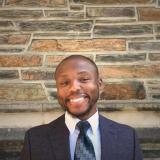
ADMISSIONS
Deadlines:
Fall Semester and Academic Year Priority Deadline: December 15
Fall Semester and Academic Year Regular Deadline: March 1
Spring Semester Priority Deadline: August 15
Spring Semester Regular Deadline: October 1 - extended to October 15
This program has a priority deadline. Students who apply by the December deadline for the Fall and Academic Year semesters will receive an admission decision before the end of the Spring semester drop/add period. Students who apply by the August deadline for the Spring semester, will receive an admission decision before the end of the Fall semester drop/add period. Applications received after the priority deadline will be considered on an individual basis until the program fills; after that, qualified students are added to a waitlist and notified of openings. Applications must be received by the deadline to be considered.
Eligibility: Applicants must have completed at least one Spanish course at the advanced level (Duke SPANISH 300 level) or have equivalent proficiency. By exception, applications will be considered from students who have completed Spanish 204 (four semesters) with high marks.
Priority: Spanish major and minors, students applying for the full year and students who meet the pre-requisites will be given priority.
Minimum GPA: Priority will be given to students with high academic standing (normally with at least a 3.0 GPA). The minimum cumulative grade point average (GPA) required for Duke students wishing to study away during the semester is 2.7 (3.0 for Pratt students) on a scale of 4.0.
Non-Duke students: Non-Duke students are welcome to apply for this program. You must be a degree-seeking student in good standing at an accredited college or university. Consult your university’s registrar and/or study away advisor for assistance with transfer credit. Students who are not matriculated at a college or university are not eligible to participate in Duke’s study away programs.
Late applicants: After published deadlines, qualified applicants will be considered on a space-available basis.
APPLY
Start your application early to ensure that it is complete by the deadline! Incomplete applications will not be forwarded to the program directors for consideration.
Submit the following items using MyGlobalEd:
- On-line application.
- Transcript(s) from all colleges and universities attended. First-year students should wait for fall semester grades to be posted before submitting their transcript.
- Personal statement, written in Spanish, explaining your interest and goals for studying in Spain on the Duke in Madrid program.
- Language recommendation*
- Duke in Madrid Housing Questionnaire
- GEO Language Program Questionnaire
*If you have not taken Spanish at Duke, but believe you have the required Spanish proficiency, please schedule a Spanish Placement Exam with the Spanish Department by emailing spanish@duke.edu. The results should be sent to globaled@duke.edu by the application deadline. Recommendation letters from high school teachers will not be accepted.
